Analyzing Challenges Faced by Nurses During COVID-19 in Surgical Wards
VerifiedAdded on 2023/06/11
|26
|5937
|197
Report
AI Summary
This report investigates the challenges faced by nurses in surgical wards during the COVID-19 pandemic. It aims to evaluate the impact of COVID-19 on nurses, analyze the different leadership styles employed, and identify the impact on their mental health. The research utilizes both primary and secondary data collection methods, emphasizing the importance of ethical practices. A thematic review of literature highlights the psychological stress, workload, and risks faced by nurses, along with the impact on their sleep quality, and increased symptoms of depression, anxiety and stress. The report also explores the relationship between leadership styles and patient safety, noting the positive impact of transformational leadership and the negative impact of laissez-faire leadership. The findings underscore the need for interventions and support systems to address the mental health challenges faced by nurses during the pandemic.
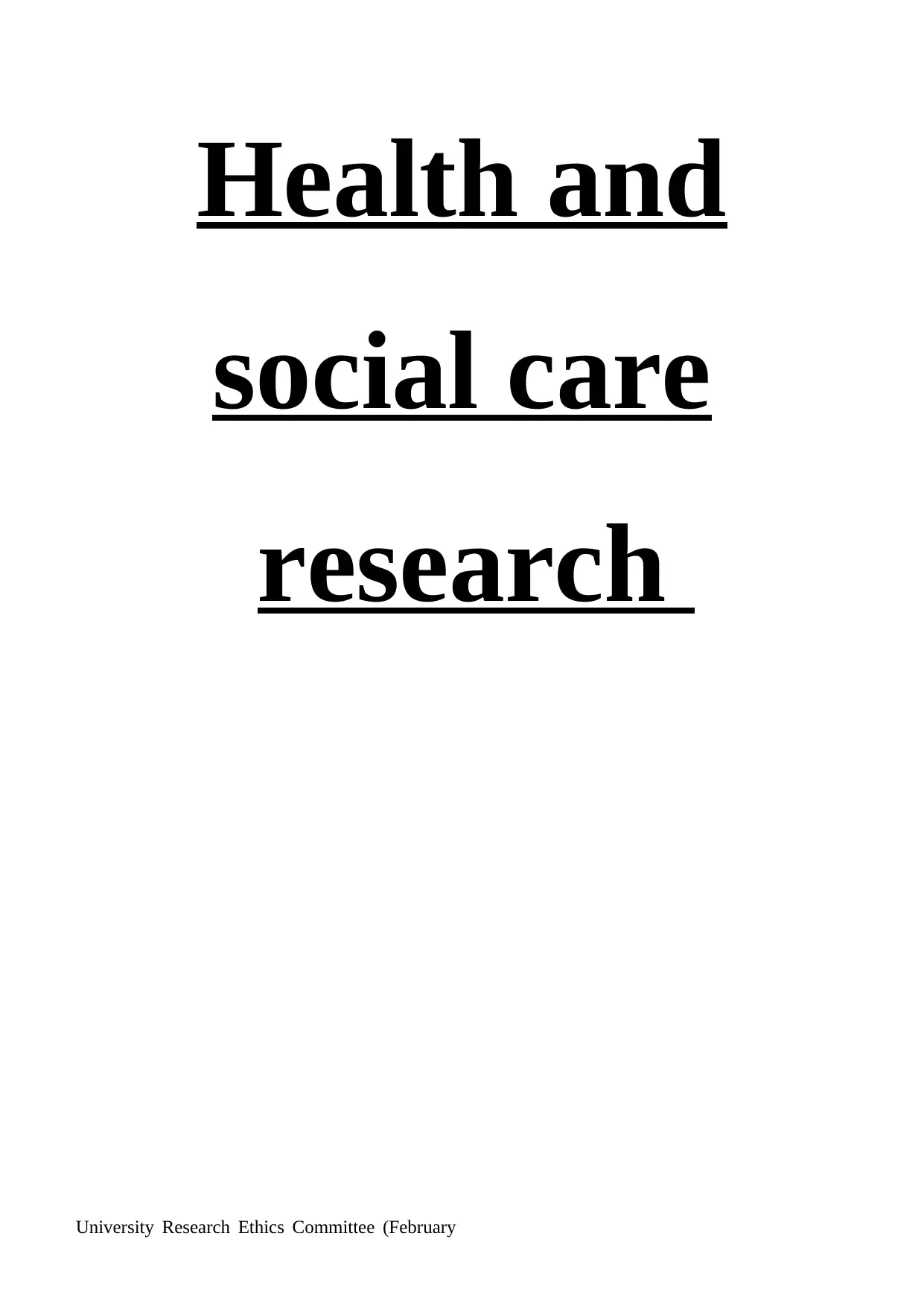
University Research Ethics Committee (February
2018)
Health and
social care
research
2018)
Health and
social care
research
Paraphrase This Document
Need a fresh take? Get an instant paraphrase of this document with our AI Paraphraser
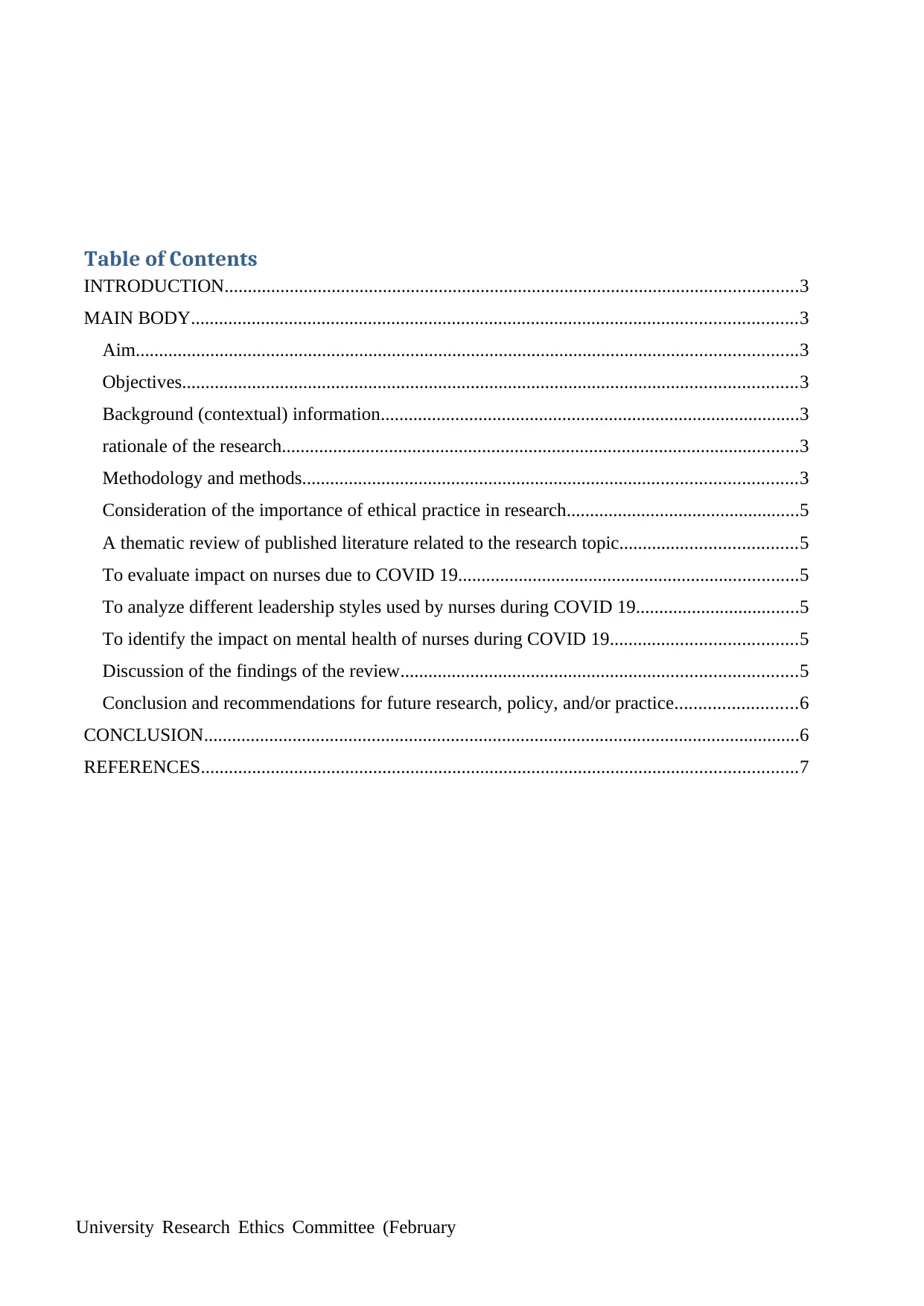
University Research Ethics Committee (February
2018)
Table of Contents
INTRODUCTION...........................................................................................................................3
MAIN BODY..................................................................................................................................3
Aim..............................................................................................................................................3
Objectives....................................................................................................................................3
Background (contextual) information..........................................................................................3
rationale of the research...............................................................................................................3
Methodology and methods..........................................................................................................3
Consideration of the importance of ethical practice in research..................................................5
A thematic review of published literature related to the research topic......................................5
To evaluate impact on nurses due to COVID 19.........................................................................5
To analyze different leadership styles used by nurses during COVID 19...................................5
To identify the impact on mental health of nurses during COVID 19........................................5
Discussion of the findings of the review.....................................................................................5
Conclusion and recommendations for future research, policy, and/or practice..........................6
CONCLUSION................................................................................................................................6
REFERENCES................................................................................................................................7
2018)
Table of Contents
INTRODUCTION...........................................................................................................................3
MAIN BODY..................................................................................................................................3
Aim..............................................................................................................................................3
Objectives....................................................................................................................................3
Background (contextual) information..........................................................................................3
rationale of the research...............................................................................................................3
Methodology and methods..........................................................................................................3
Consideration of the importance of ethical practice in research..................................................5
A thematic review of published literature related to the research topic......................................5
To evaluate impact on nurses due to COVID 19.........................................................................5
To analyze different leadership styles used by nurses during COVID 19...................................5
To identify the impact on mental health of nurses during COVID 19........................................5
Discussion of the findings of the review.....................................................................................5
Conclusion and recommendations for future research, policy, and/or practice..........................6
CONCLUSION................................................................................................................................6
REFERENCES................................................................................................................................7
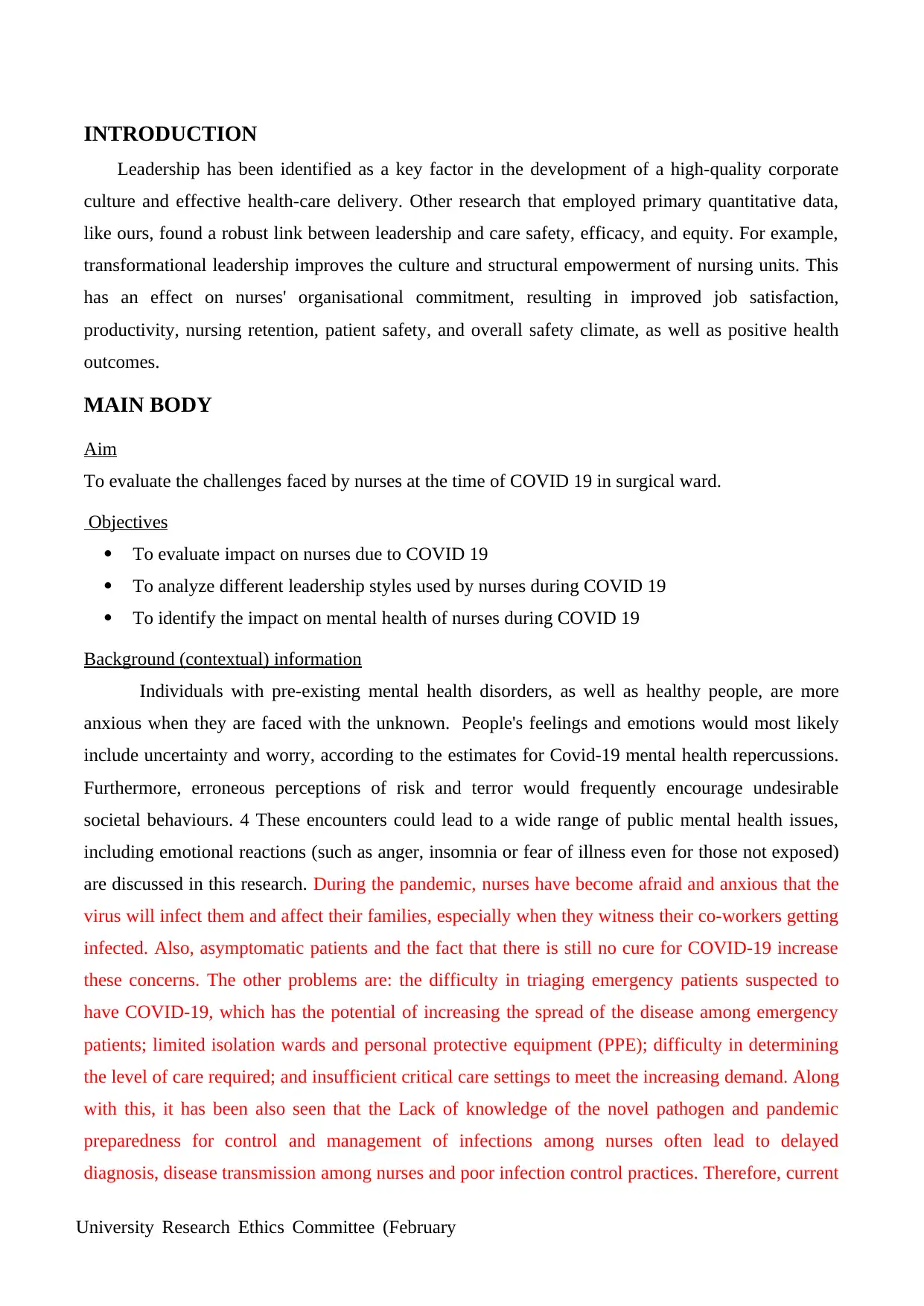
University Research Ethics Committee (February
2018)
INTRODUCTION
Leadership has been identified as a key factor in the development of a high-quality corporate
culture and effective health-care delivery. Other research that employed primary quantitative data,
like ours, found a robust link between leadership and care safety, efficacy, and equity. For example,
transformational leadership improves the culture and structural empowerment of nursing units. This
has an effect on nurses' organisational commitment, resulting in improved job satisfaction,
productivity, nursing retention, patient safety, and overall safety climate, as well as positive health
outcomes.
MAIN BODY
Aim
To evaluate the challenges faced by nurses at the time of COVID 19 in surgical ward.
Objectives
To evaluate impact on nurses due to COVID 19
To analyze different leadership styles used by nurses during COVID 19
To identify the impact on mental health of nurses during COVID 19
Background (contextual) information
Individuals with pre-existing mental health disorders, as well as healthy people, are more
anxious when they are faced with the unknown. People's feelings and emotions would most likely
include uncertainty and worry, according to the estimates for Covid-19 mental health repercussions.
Furthermore, erroneous perceptions of risk and terror would frequently encourage undesirable
societal behaviours. 4 These encounters could lead to a wide range of public mental health issues,
including emotional reactions (such as anger, insomnia or fear of illness even for those not exposed)
are discussed in this research. During the pandemic, nurses have become afraid and anxious that the
virus will infect them and affect their families, especially when they witness their co-workers getting
infected. Also, asymptomatic patients and the fact that there is still no cure for COVID-19 increase
these concerns. The other problems are: the difficulty in triaging emergency patients suspected to
have COVID-19, which has the potential of increasing the spread of the disease among emergency
patients; limited isolation wards and personal protective equipment (PPE); difficulty in determining
the level of care required; and insufficient critical care settings to meet the increasing demand. Along
with this, it has been also seen that the Lack of knowledge of the novel pathogen and pandemic
preparedness for control and management of infections among nurses often lead to delayed
diagnosis, disease transmission among nurses and poor infection control practices. Therefore, current
2018)
INTRODUCTION
Leadership has been identified as a key factor in the development of a high-quality corporate
culture and effective health-care delivery. Other research that employed primary quantitative data,
like ours, found a robust link between leadership and care safety, efficacy, and equity. For example,
transformational leadership improves the culture and structural empowerment of nursing units. This
has an effect on nurses' organisational commitment, resulting in improved job satisfaction,
productivity, nursing retention, patient safety, and overall safety climate, as well as positive health
outcomes.
MAIN BODY
Aim
To evaluate the challenges faced by nurses at the time of COVID 19 in surgical ward.
Objectives
To evaluate impact on nurses due to COVID 19
To analyze different leadership styles used by nurses during COVID 19
To identify the impact on mental health of nurses during COVID 19
Background (contextual) information
Individuals with pre-existing mental health disorders, as well as healthy people, are more
anxious when they are faced with the unknown. People's feelings and emotions would most likely
include uncertainty and worry, according to the estimates for Covid-19 mental health repercussions.
Furthermore, erroneous perceptions of risk and terror would frequently encourage undesirable
societal behaviours. 4 These encounters could lead to a wide range of public mental health issues,
including emotional reactions (such as anger, insomnia or fear of illness even for those not exposed)
are discussed in this research. During the pandemic, nurses have become afraid and anxious that the
virus will infect them and affect their families, especially when they witness their co-workers getting
infected. Also, asymptomatic patients and the fact that there is still no cure for COVID-19 increase
these concerns. The other problems are: the difficulty in triaging emergency patients suspected to
have COVID-19, which has the potential of increasing the spread of the disease among emergency
patients; limited isolation wards and personal protective equipment (PPE); difficulty in determining
the level of care required; and insufficient critical care settings to meet the increasing demand. Along
with this, it has been also seen that the Lack of knowledge of the novel pathogen and pandemic
preparedness for control and management of infections among nurses often lead to delayed
diagnosis, disease transmission among nurses and poor infection control practices. Therefore, current
⊘ This is a preview!⊘
Do you want full access?
Subscribe today to unlock all pages.

Trusted by 1+ million students worldwide
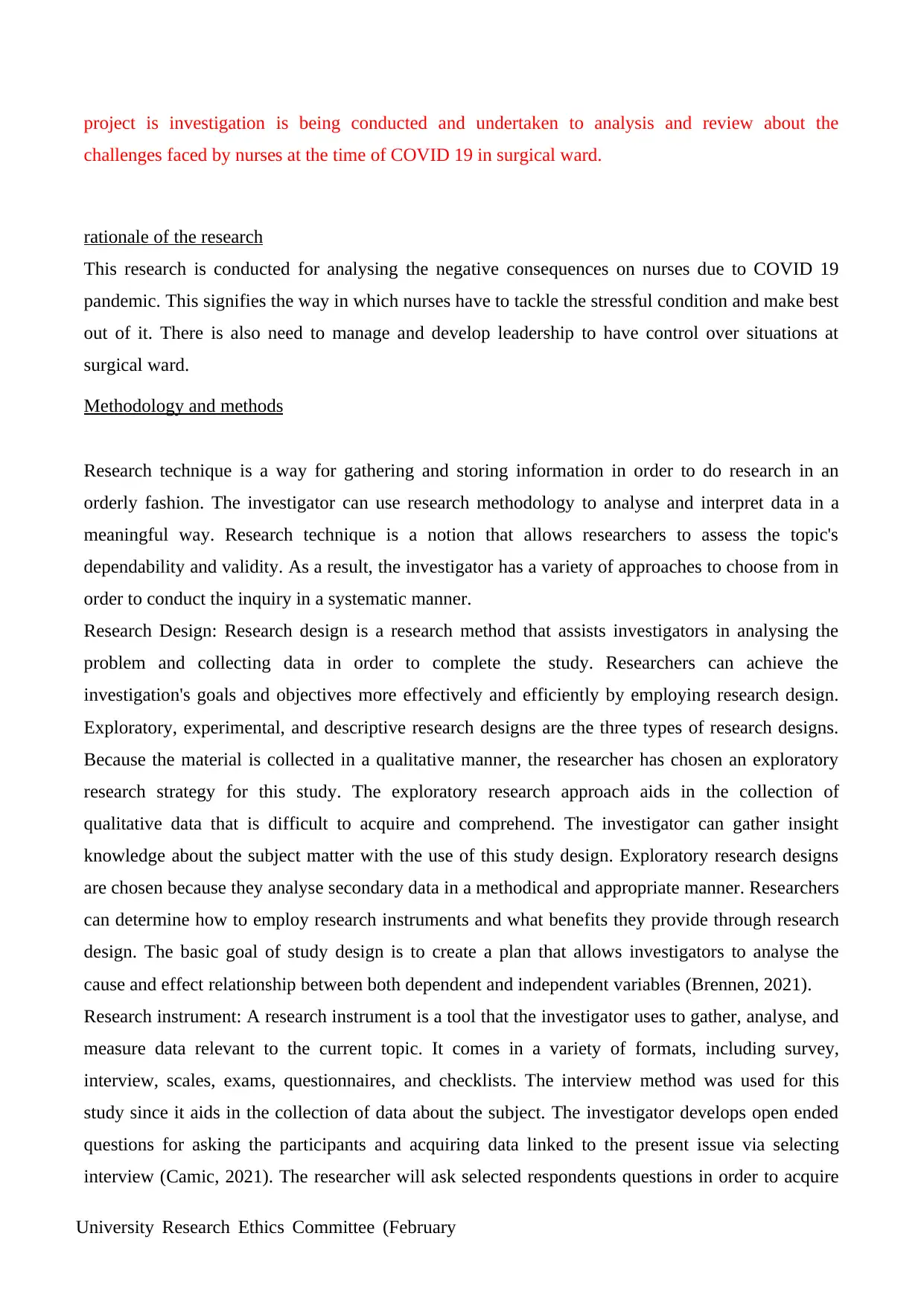
University Research Ethics Committee (February
2018)
project is investigation is being conducted and undertaken to analysis and review about the
challenges faced by nurses at the time of COVID 19 in surgical ward.
rationale of the research
This research is conducted for analysing the negative consequences on nurses due to COVID 19
pandemic. This signifies the way in which nurses have to tackle the stressful condition and make best
out of it. There is also need to manage and develop leadership to have control over situations at
surgical ward.
Methodology and methods
Research technique is a way for gathering and storing information in order to do research in an
orderly fashion. The investigator can use research methodology to analyse and interpret data in a
meaningful way. Research technique is a notion that allows researchers to assess the topic's
dependability and validity. As a result, the investigator has a variety of approaches to choose from in
order to conduct the inquiry in a systematic manner.
Research Design: Research design is a research method that assists investigators in analysing the
problem and collecting data in order to complete the study. Researchers can achieve the
investigation's goals and objectives more effectively and efficiently by employing research design.
Exploratory, experimental, and descriptive research designs are the three types of research designs.
Because the material is collected in a qualitative manner, the researcher has chosen an exploratory
research strategy for this study. The exploratory research approach aids in the collection of
qualitative data that is difficult to acquire and comprehend. The investigator can gather insight
knowledge about the subject matter with the use of this study design. Exploratory research designs
are chosen because they analyse secondary data in a methodical and appropriate manner. Researchers
can determine how to employ research instruments and what benefits they provide through research
design. The basic goal of study design is to create a plan that allows investigators to analyse the
cause and effect relationship between both dependent and independent variables (Brennen, 2021).
Research instrument: A research instrument is a tool that the investigator uses to gather, analyse, and
measure data relevant to the current topic. It comes in a variety of formats, including survey,
interview, scales, exams, questionnaires, and checklists. The interview method was used for this
study since it aids in the collection of data about the subject. The investigator develops open ended
questions for asking the participants and acquiring data linked to the present issue via selecting
interview (Camic, 2021). The researcher will ask selected respondents questions in order to acquire
2018)
project is investigation is being conducted and undertaken to analysis and review about the
challenges faced by nurses at the time of COVID 19 in surgical ward.
rationale of the research
This research is conducted for analysing the negative consequences on nurses due to COVID 19
pandemic. This signifies the way in which nurses have to tackle the stressful condition and make best
out of it. There is also need to manage and develop leadership to have control over situations at
surgical ward.
Methodology and methods
Research technique is a way for gathering and storing information in order to do research in an
orderly fashion. The investigator can use research methodology to analyse and interpret data in a
meaningful way. Research technique is a notion that allows researchers to assess the topic's
dependability and validity. As a result, the investigator has a variety of approaches to choose from in
order to conduct the inquiry in a systematic manner.
Research Design: Research design is a research method that assists investigators in analysing the
problem and collecting data in order to complete the study. Researchers can achieve the
investigation's goals and objectives more effectively and efficiently by employing research design.
Exploratory, experimental, and descriptive research designs are the three types of research designs.
Because the material is collected in a qualitative manner, the researcher has chosen an exploratory
research strategy for this study. The exploratory research approach aids in the collection of
qualitative data that is difficult to acquire and comprehend. The investigator can gather insight
knowledge about the subject matter with the use of this study design. Exploratory research designs
are chosen because they analyse secondary data in a methodical and appropriate manner. Researchers
can determine how to employ research instruments and what benefits they provide through research
design. The basic goal of study design is to create a plan that allows investigators to analyse the
cause and effect relationship between both dependent and independent variables (Brennen, 2021).
Research instrument: A research instrument is a tool that the investigator uses to gather, analyse, and
measure data relevant to the current topic. It comes in a variety of formats, including survey,
interview, scales, exams, questionnaires, and checklists. The interview method was used for this
study since it aids in the collection of data about the subject. The investigator develops open ended
questions for asking the participants and acquiring data linked to the present issue via selecting
interview (Camic, 2021). The researcher will ask selected respondents questions in order to acquire
Paraphrase This Document
Need a fresh take? Get an instant paraphrase of this document with our AI Paraphraser
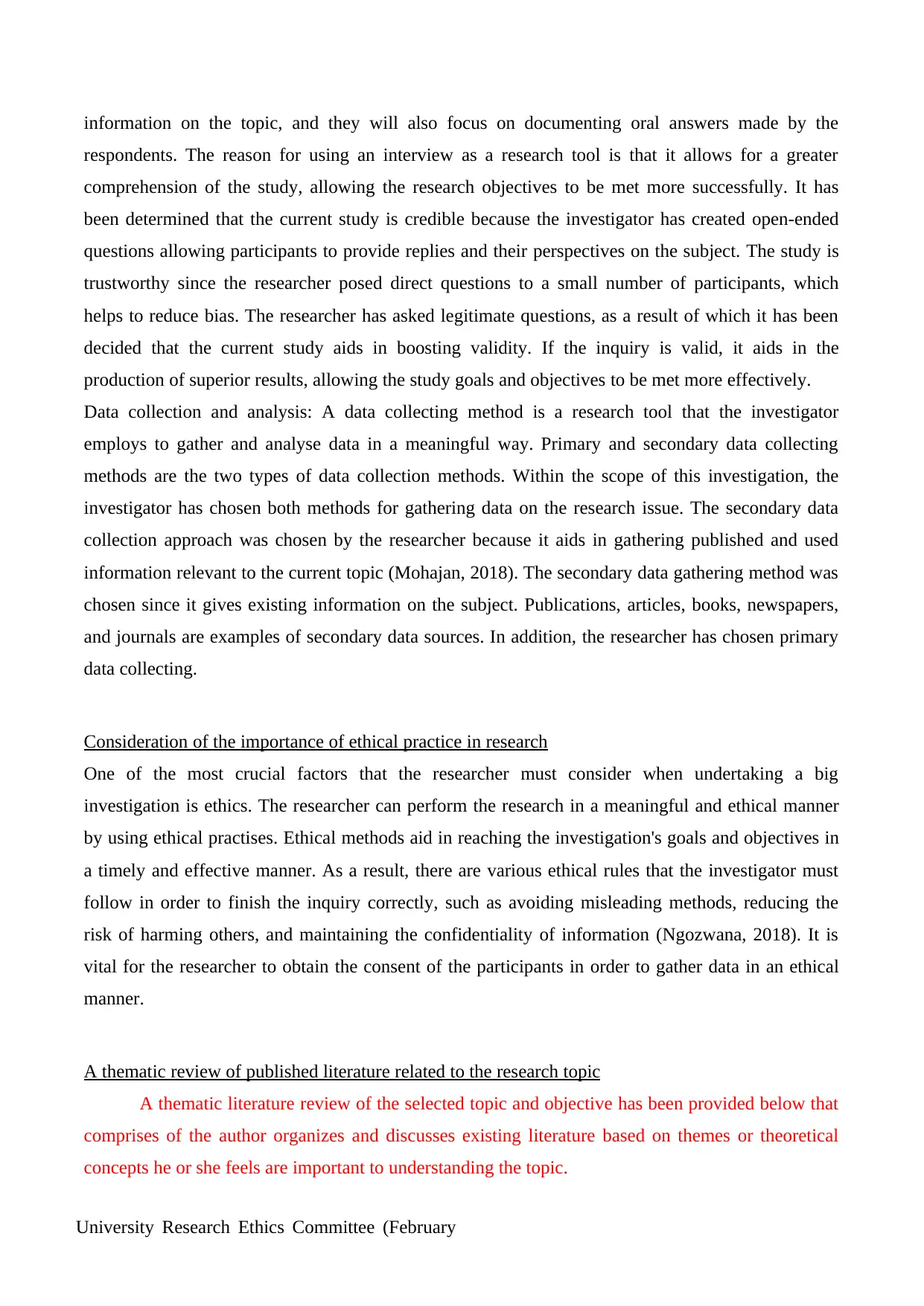
University Research Ethics Committee (February
2018)
information on the topic, and they will also focus on documenting oral answers made by the
respondents. The reason for using an interview as a research tool is that it allows for a greater
comprehension of the study, allowing the research objectives to be met more successfully. It has
been determined that the current study is credible because the investigator has created open-ended
questions allowing participants to provide replies and their perspectives on the subject. The study is
trustworthy since the researcher posed direct questions to a small number of participants, which
helps to reduce bias. The researcher has asked legitimate questions, as a result of which it has been
decided that the current study aids in boosting validity. If the inquiry is valid, it aids in the
production of superior results, allowing the study goals and objectives to be met more effectively.
Data collection and analysis: A data collecting method is a research tool that the investigator
employs to gather and analyse data in a meaningful way. Primary and secondary data collecting
methods are the two types of data collection methods. Within the scope of this investigation, the
investigator has chosen both methods for gathering data on the research issue. The secondary data
collection approach was chosen by the researcher because it aids in gathering published and used
information relevant to the current topic (Mohajan, 2018). The secondary data gathering method was
chosen since it gives existing information on the subject. Publications, articles, books, newspapers,
and journals are examples of secondary data sources. In addition, the researcher has chosen primary
data collecting.
Consideration of the importance of ethical practice in research
One of the most crucial factors that the researcher must consider when undertaking a big
investigation is ethics. The researcher can perform the research in a meaningful and ethical manner
by using ethical practises. Ethical methods aid in reaching the investigation's goals and objectives in
a timely and effective manner. As a result, there are various ethical rules that the investigator must
follow in order to finish the inquiry correctly, such as avoiding misleading methods, reducing the
risk of harming others, and maintaining the confidentiality of information (Ngozwana, 2018). It is
vital for the researcher to obtain the consent of the participants in order to gather data in an ethical
manner.
A thematic review of published literature related to the research topic
A thematic literature review of the selected topic and objective has been provided below that
comprises of the author organizes and discusses existing literature based on themes or theoretical
concepts he or she feels are important to understanding the topic.
2018)
information on the topic, and they will also focus on documenting oral answers made by the
respondents. The reason for using an interview as a research tool is that it allows for a greater
comprehension of the study, allowing the research objectives to be met more successfully. It has
been determined that the current study is credible because the investigator has created open-ended
questions allowing participants to provide replies and their perspectives on the subject. The study is
trustworthy since the researcher posed direct questions to a small number of participants, which
helps to reduce bias. The researcher has asked legitimate questions, as a result of which it has been
decided that the current study aids in boosting validity. If the inquiry is valid, it aids in the
production of superior results, allowing the study goals and objectives to be met more effectively.
Data collection and analysis: A data collecting method is a research tool that the investigator
employs to gather and analyse data in a meaningful way. Primary and secondary data collecting
methods are the two types of data collection methods. Within the scope of this investigation, the
investigator has chosen both methods for gathering data on the research issue. The secondary data
collection approach was chosen by the researcher because it aids in gathering published and used
information relevant to the current topic (Mohajan, 2018). The secondary data gathering method was
chosen since it gives existing information on the subject. Publications, articles, books, newspapers,
and journals are examples of secondary data sources. In addition, the researcher has chosen primary
data collecting.
Consideration of the importance of ethical practice in research
One of the most crucial factors that the researcher must consider when undertaking a big
investigation is ethics. The researcher can perform the research in a meaningful and ethical manner
by using ethical practises. Ethical methods aid in reaching the investigation's goals and objectives in
a timely and effective manner. As a result, there are various ethical rules that the investigator must
follow in order to finish the inquiry correctly, such as avoiding misleading methods, reducing the
risk of harming others, and maintaining the confidentiality of information (Ngozwana, 2018). It is
vital for the researcher to obtain the consent of the participants in order to gather data in an ethical
manner.
A thematic review of published literature related to the research topic
A thematic literature review of the selected topic and objective has been provided below that
comprises of the author organizes and discusses existing literature based on themes or theoretical
concepts he or she feels are important to understanding the topic.
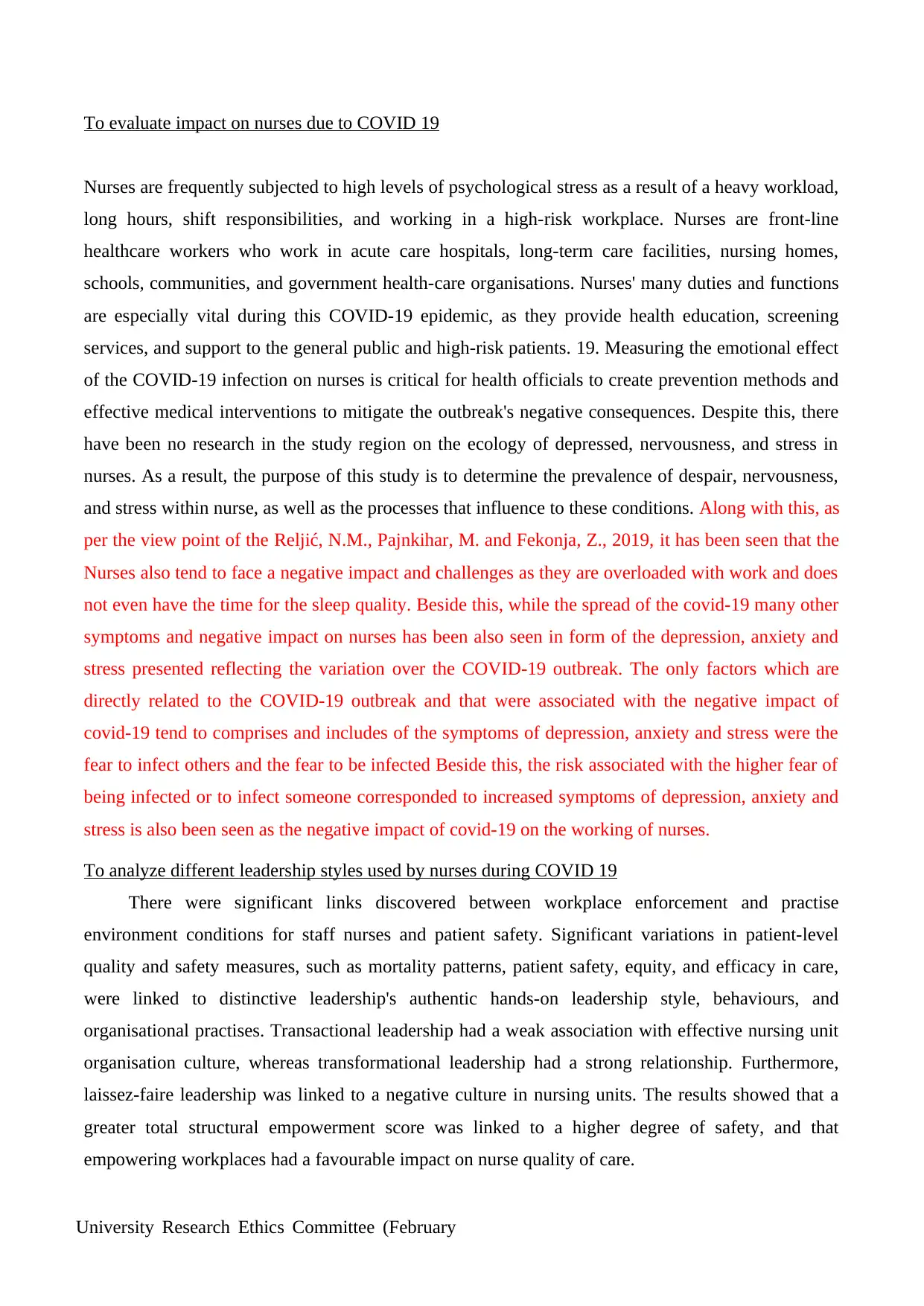
University Research Ethics Committee (February
2018)
To evaluate impact on nurses due to COVID 19
Nurses are frequently subjected to high levels of psychological stress as a result of a heavy workload,
long hours, shift responsibilities, and working in a high-risk workplace. Nurses are front-line
healthcare workers who work in acute care hospitals, long-term care facilities, nursing homes,
schools, communities, and government health-care organisations. Nurses' many duties and functions
are especially vital during this COVID-19 epidemic, as they provide health education, screening
services, and support to the general public and high-risk patients. 19. Measuring the emotional effect
of the COVID-19 infection on nurses is critical for health officials to create prevention methods and
effective medical interventions to mitigate the outbreak's negative consequences. Despite this, there
have been no research in the study region on the ecology of depressed, nervousness, and stress in
nurses. As a result, the purpose of this study is to determine the prevalence of despair, nervousness,
and stress within nurse, as well as the processes that influence to these conditions. Along with this, as
per the view point of the Reljić, N.M., Pajnkihar, M. and Fekonja, Z., 2019, it has been seen that the
Nurses also tend to face a negative impact and challenges as they are overloaded with work and does
not even have the time for the sleep quality. Beside this, while the spread of the covid-19 many other
symptoms and negative impact on nurses has been also seen in form of the depression, anxiety and
stress presented reflecting the variation over the COVID-19 outbreak. The only factors which are
directly related to the COVID-19 outbreak and that were associated with the negative impact of
covid-19 tend to comprises and includes of the symptoms of depression, anxiety and stress were the
fear to infect others and the fear to be infected Beside this, the risk associated with the higher fear of
being infected or to infect someone corresponded to increased symptoms of depression, anxiety and
stress is also been seen as the negative impact of covid-19 on the working of nurses.
To analyze different leadership styles used by nurses during COVID 19
There were significant links discovered between workplace enforcement and practise
environment conditions for staff nurses and patient safety. Significant variations in patient-level
quality and safety measures, such as mortality patterns, patient safety, equity, and efficacy in care,
were linked to distinctive leadership's authentic hands-on leadership style, behaviours, and
organisational practises. Transactional leadership had a weak association with effective nursing unit
organisation culture, whereas transformational leadership had a strong relationship. Furthermore,
laissez-faire leadership was linked to a negative culture in nursing units. The results showed that a
greater total structural empowerment score was linked to a higher degree of safety, and that
empowering workplaces had a favourable impact on nurse quality of care.
2018)
To evaluate impact on nurses due to COVID 19
Nurses are frequently subjected to high levels of psychological stress as a result of a heavy workload,
long hours, shift responsibilities, and working in a high-risk workplace. Nurses are front-line
healthcare workers who work in acute care hospitals, long-term care facilities, nursing homes,
schools, communities, and government health-care organisations. Nurses' many duties and functions
are especially vital during this COVID-19 epidemic, as they provide health education, screening
services, and support to the general public and high-risk patients. 19. Measuring the emotional effect
of the COVID-19 infection on nurses is critical for health officials to create prevention methods and
effective medical interventions to mitigate the outbreak's negative consequences. Despite this, there
have been no research in the study region on the ecology of depressed, nervousness, and stress in
nurses. As a result, the purpose of this study is to determine the prevalence of despair, nervousness,
and stress within nurse, as well as the processes that influence to these conditions. Along with this, as
per the view point of the Reljić, N.M., Pajnkihar, M. and Fekonja, Z., 2019, it has been seen that the
Nurses also tend to face a negative impact and challenges as they are overloaded with work and does
not even have the time for the sleep quality. Beside this, while the spread of the covid-19 many other
symptoms and negative impact on nurses has been also seen in form of the depression, anxiety and
stress presented reflecting the variation over the COVID-19 outbreak. The only factors which are
directly related to the COVID-19 outbreak and that were associated with the negative impact of
covid-19 tend to comprises and includes of the symptoms of depression, anxiety and stress were the
fear to infect others and the fear to be infected Beside this, the risk associated with the higher fear of
being infected or to infect someone corresponded to increased symptoms of depression, anxiety and
stress is also been seen as the negative impact of covid-19 on the working of nurses.
To analyze different leadership styles used by nurses during COVID 19
There were significant links discovered between workplace enforcement and practise
environment conditions for staff nurses and patient safety. Significant variations in patient-level
quality and safety measures, such as mortality patterns, patient safety, equity, and efficacy in care,
were linked to distinctive leadership's authentic hands-on leadership style, behaviours, and
organisational practises. Transactional leadership had a weak association with effective nursing unit
organisation culture, whereas transformational leadership had a strong relationship. Furthermore,
laissez-faire leadership was linked to a negative culture in nursing units. The results showed that a
greater total structural empowerment score was linked to a higher degree of safety, and that
empowering workplaces had a favourable impact on nurse quality of care.
⊘ This is a preview!⊘
Do you want full access?
Subscribe today to unlock all pages.

Trusted by 1+ million students worldwide
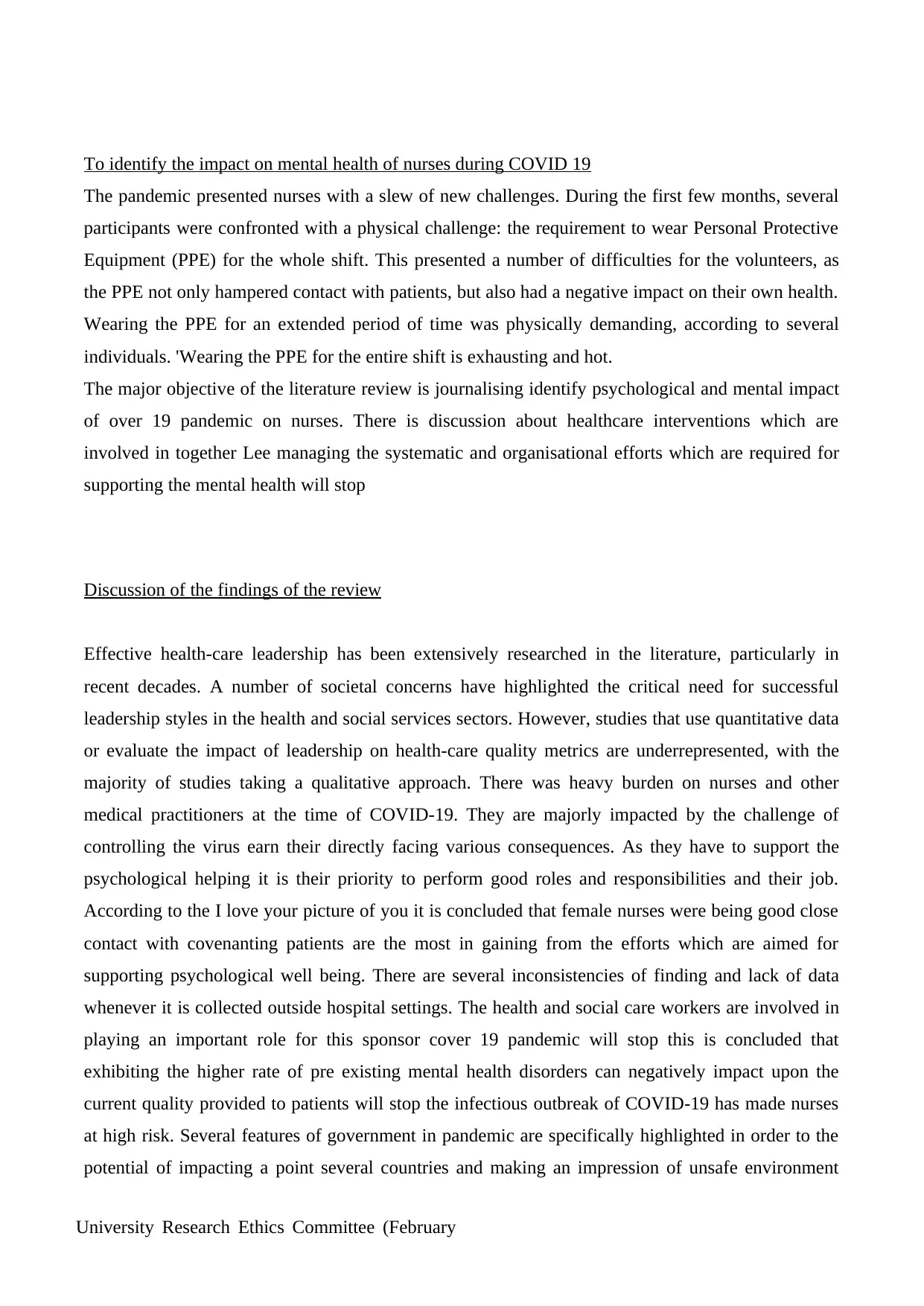
University Research Ethics Committee (February
2018)
To identify the impact on mental health of nurses during COVID 19
The pandemic presented nurses with a slew of new challenges. During the first few months, several
participants were confronted with a physical challenge: the requirement to wear Personal Protective
Equipment (PPE) for the whole shift. This presented a number of difficulties for the volunteers, as
the PPE not only hampered contact with patients, but also had a negative impact on their own health.
Wearing the PPE for an extended period of time was physically demanding, according to several
individuals. 'Wearing the PPE for the entire shift is exhausting and hot.
The major objective of the literature review is journalising identify psychological and mental impact
of over 19 pandemic on nurses. There is discussion about healthcare interventions which are
involved in together Lee managing the systematic and organisational efforts which are required for
supporting the mental health will stop
Discussion of the findings of the review
Effective health-care leadership has been extensively researched in the literature, particularly in
recent decades. A number of societal concerns have highlighted the critical need for successful
leadership styles in the health and social services sectors. However, studies that use quantitative data
or evaluate the impact of leadership on health-care quality metrics are underrepresented, with the
majority of studies taking a qualitative approach. There was heavy burden on nurses and other
medical practitioners at the time of COVID-19. They are majorly impacted by the challenge of
controlling the virus earn their directly facing various consequences. As they have to support the
psychological helping it is their priority to perform good roles and responsibilities and their job.
According to the I love your picture of you it is concluded that female nurses were being good close
contact with covenanting patients are the most in gaining from the efforts which are aimed for
supporting psychological well being. There are several inconsistencies of finding and lack of data
whenever it is collected outside hospital settings. The health and social care workers are involved in
playing an important role for this sponsor cover 19 pandemic will stop this is concluded that
exhibiting the higher rate of pre existing mental health disorders can negatively impact upon the
current quality provided to patients will stop the infectious outbreak of COVID-19 has made nurses
at high risk. Several features of government in pandemic are specifically highlighted in order to the
potential of impacting a point several countries and making an impression of unsafe environment
2018)
To identify the impact on mental health of nurses during COVID 19
The pandemic presented nurses with a slew of new challenges. During the first few months, several
participants were confronted with a physical challenge: the requirement to wear Personal Protective
Equipment (PPE) for the whole shift. This presented a number of difficulties for the volunteers, as
the PPE not only hampered contact with patients, but also had a negative impact on their own health.
Wearing the PPE for an extended period of time was physically demanding, according to several
individuals. 'Wearing the PPE for the entire shift is exhausting and hot.
The major objective of the literature review is journalising identify psychological and mental impact
of over 19 pandemic on nurses. There is discussion about healthcare interventions which are
involved in together Lee managing the systematic and organisational efforts which are required for
supporting the mental health will stop
Discussion of the findings of the review
Effective health-care leadership has been extensively researched in the literature, particularly in
recent decades. A number of societal concerns have highlighted the critical need for successful
leadership styles in the health and social services sectors. However, studies that use quantitative data
or evaluate the impact of leadership on health-care quality metrics are underrepresented, with the
majority of studies taking a qualitative approach. There was heavy burden on nurses and other
medical practitioners at the time of COVID-19. They are majorly impacted by the challenge of
controlling the virus earn their directly facing various consequences. As they have to support the
psychological helping it is their priority to perform good roles and responsibilities and their job.
According to the I love your picture of you it is concluded that female nurses were being good close
contact with covenanting patients are the most in gaining from the efforts which are aimed for
supporting psychological well being. There are several inconsistencies of finding and lack of data
whenever it is collected outside hospital settings. The health and social care workers are involved in
playing an important role for this sponsor cover 19 pandemic will stop this is concluded that
exhibiting the higher rate of pre existing mental health disorders can negatively impact upon the
current quality provided to patients will stop the infectious outbreak of COVID-19 has made nurses
at high risk. Several features of government in pandemic are specifically highlighted in order to the
potential of impacting a point several countries and making an impression of unsafe environment
Paraphrase This Document
Need a fresh take? Get an instant paraphrase of this document with our AI Paraphraser
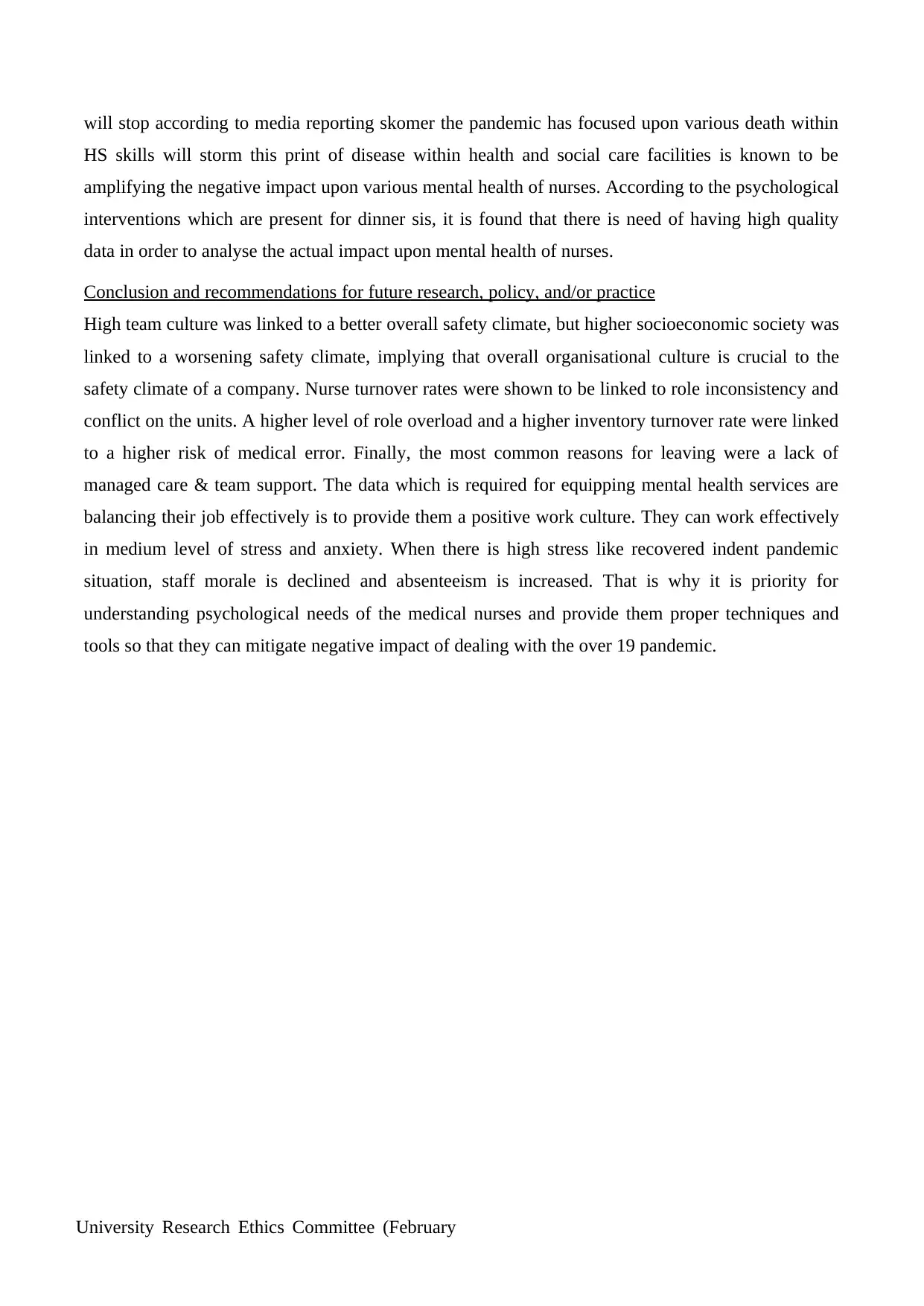
University Research Ethics Committee (February
2018)
will stop according to media reporting skomer the pandemic has focused upon various death within
HS skills will storm this print of disease within health and social care facilities is known to be
amplifying the negative impact upon various mental health of nurses. According to the psychological
interventions which are present for dinner sis, it is found that there is need of having high quality
data in order to analyse the actual impact upon mental health of nurses.
Conclusion and recommendations for future research, policy, and/or practice
High team culture was linked to a better overall safety climate, but higher socioeconomic society was
linked to a worsening safety climate, implying that overall organisational culture is crucial to the
safety climate of a company. Nurse turnover rates were shown to be linked to role inconsistency and
conflict on the units. A higher level of role overload and a higher inventory turnover rate were linked
to a higher risk of medical error. Finally, the most common reasons for leaving were a lack of
managed care & team support. The data which is required for equipping mental health services are
balancing their job effectively is to provide them a positive work culture. They can work effectively
in medium level of stress and anxiety. When there is high stress like recovered indent pandemic
situation, staff morale is declined and absenteeism is increased. That is why it is priority for
understanding psychological needs of the medical nurses and provide them proper techniques and
tools so that they can mitigate negative impact of dealing with the over 19 pandemic.
2018)
will stop according to media reporting skomer the pandemic has focused upon various death within
HS skills will storm this print of disease within health and social care facilities is known to be
amplifying the negative impact upon various mental health of nurses. According to the psychological
interventions which are present for dinner sis, it is found that there is need of having high quality
data in order to analyse the actual impact upon mental health of nurses.
Conclusion and recommendations for future research, policy, and/or practice
High team culture was linked to a better overall safety climate, but higher socioeconomic society was
linked to a worsening safety climate, implying that overall organisational culture is crucial to the
safety climate of a company. Nurse turnover rates were shown to be linked to role inconsistency and
conflict on the units. A higher level of role overload and a higher inventory turnover rate were linked
to a higher risk of medical error. Finally, the most common reasons for leaving were a lack of
managed care & team support. The data which is required for equipping mental health services are
balancing their job effectively is to provide them a positive work culture. They can work effectively
in medium level of stress and anxiety. When there is high stress like recovered indent pandemic
situation, staff morale is declined and absenteeism is increased. That is why it is priority for
understanding psychological needs of the medical nurses and provide them proper techniques and
tools so that they can mitigate negative impact of dealing with the over 19 pandemic.
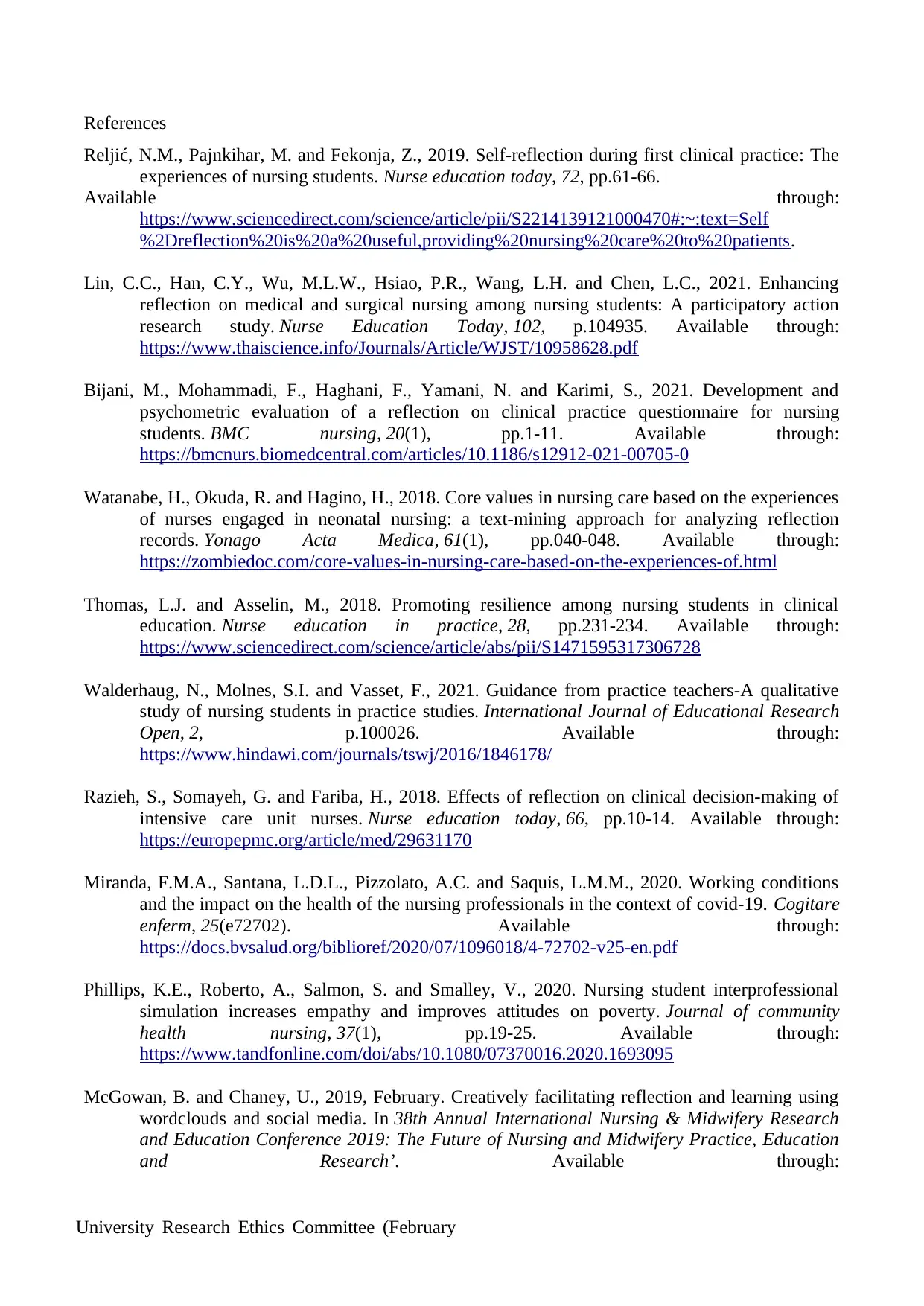
University Research Ethics Committee (February
2018)
References
Reljić, N.M., Pajnkihar, M. and Fekonja, Z., 2019. Self-reflection during first clinical practice: The
experiences of nursing students. Nurse education today, 72, pp.61-66.
Available through:
https://www.sciencedirect.com/science/article/pii/S2214139121000470#:~:text=Self
%2Dreflection%20is%20a%20useful,providing%20nursing%20care%20to%20patients.
Lin, C.C., Han, C.Y., Wu, M.L.W., Hsiao, P.R., Wang, L.H. and Chen, L.C., 2021. Enhancing
reflection on medical and surgical nursing among nursing students: A participatory action
research study. Nurse Education Today, 102, p.104935. Available through:
https://www.thaiscience.info/Journals/Article/WJST/10958628.pdf
Bijani, M., Mohammadi, F., Haghani, F., Yamani, N. and Karimi, S., 2021. Development and
psychometric evaluation of a reflection on clinical practice questionnaire for nursing
students. BMC nursing, 20(1), pp.1-11. Available through:
https://bmcnurs.biomedcentral.com/articles/10.1186/s12912-021-00705-0
Watanabe, H., Okuda, R. and Hagino, H., 2018. Core values in nursing care based on the experiences
of nurses engaged in neonatal nursing: a text-mining approach for analyzing reflection
records. Yonago Acta Medica, 61(1), pp.040-048. Available through:
https://zombiedoc.com/core-values-in-nursing-care-based-on-the-experiences-of.html
Thomas, L.J. and Asselin, M., 2018. Promoting resilience among nursing students in clinical
education. Nurse education in practice, 28, pp.231-234. Available through:
https://www.sciencedirect.com/science/article/abs/pii/S1471595317306728
Walderhaug, N., Molnes, S.I. and Vasset, F., 2021. Guidance from practice teachers-A qualitative
study of nursing students in practice studies. International Journal of Educational Research
Open, 2, p.100026. Available through:
https://www.hindawi.com/journals/tswj/2016/1846178/
Razieh, S., Somayeh, G. and Fariba, H., 2018. Effects of reflection on clinical decision-making of
intensive care unit nurses. Nurse education today, 66, pp.10-14. Available through:
https://europepmc.org/article/med/29631170
Miranda, F.M.A., Santana, L.D.L., Pizzolato, A.C. and Saquis, L.M.M., 2020. Working conditions
and the impact on the health of the nursing professionals in the context of covid-19. Cogitare
enferm, 25(e72702). Available through:
https://docs.bvsalud.org/biblioref/2020/07/1096018/4-72702-v25-en.pdf
Phillips, K.E., Roberto, A., Salmon, S. and Smalley, V., 2020. Nursing student interprofessional
simulation increases empathy and improves attitudes on poverty. Journal of community
health nursing, 37(1), pp.19-25. Available through:
https://www.tandfonline.com/doi/abs/10.1080/07370016.2020.1693095
McGowan, B. and Chaney, U., 2019, February. Creatively facilitating reflection and learning using
wordclouds and social media. In 38th Annual International Nursing & Midwifery Research
and Education Conference 2019: The Future of Nursing and Midwifery Practice, Education
and Research’. Available through:
2018)
References
Reljić, N.M., Pajnkihar, M. and Fekonja, Z., 2019. Self-reflection during first clinical practice: The
experiences of nursing students. Nurse education today, 72, pp.61-66.
Available through:
https://www.sciencedirect.com/science/article/pii/S2214139121000470#:~:text=Self
%2Dreflection%20is%20a%20useful,providing%20nursing%20care%20to%20patients.
Lin, C.C., Han, C.Y., Wu, M.L.W., Hsiao, P.R., Wang, L.H. and Chen, L.C., 2021. Enhancing
reflection on medical and surgical nursing among nursing students: A participatory action
research study. Nurse Education Today, 102, p.104935. Available through:
https://www.thaiscience.info/Journals/Article/WJST/10958628.pdf
Bijani, M., Mohammadi, F., Haghani, F., Yamani, N. and Karimi, S., 2021. Development and
psychometric evaluation of a reflection on clinical practice questionnaire for nursing
students. BMC nursing, 20(1), pp.1-11. Available through:
https://bmcnurs.biomedcentral.com/articles/10.1186/s12912-021-00705-0
Watanabe, H., Okuda, R. and Hagino, H., 2018. Core values in nursing care based on the experiences
of nurses engaged in neonatal nursing: a text-mining approach for analyzing reflection
records. Yonago Acta Medica, 61(1), pp.040-048. Available through:
https://zombiedoc.com/core-values-in-nursing-care-based-on-the-experiences-of.html
Thomas, L.J. and Asselin, M., 2018. Promoting resilience among nursing students in clinical
education. Nurse education in practice, 28, pp.231-234. Available through:
https://www.sciencedirect.com/science/article/abs/pii/S1471595317306728
Walderhaug, N., Molnes, S.I. and Vasset, F., 2021. Guidance from practice teachers-A qualitative
study of nursing students in practice studies. International Journal of Educational Research
Open, 2, p.100026. Available through:
https://www.hindawi.com/journals/tswj/2016/1846178/
Razieh, S., Somayeh, G. and Fariba, H., 2018. Effects of reflection on clinical decision-making of
intensive care unit nurses. Nurse education today, 66, pp.10-14. Available through:
https://europepmc.org/article/med/29631170
Miranda, F.M.A., Santana, L.D.L., Pizzolato, A.C. and Saquis, L.M.M., 2020. Working conditions
and the impact on the health of the nursing professionals in the context of covid-19. Cogitare
enferm, 25(e72702). Available through:
https://docs.bvsalud.org/biblioref/2020/07/1096018/4-72702-v25-en.pdf
Phillips, K.E., Roberto, A., Salmon, S. and Smalley, V., 2020. Nursing student interprofessional
simulation increases empathy and improves attitudes on poverty. Journal of community
health nursing, 37(1), pp.19-25. Available through:
https://www.tandfonline.com/doi/abs/10.1080/07370016.2020.1693095
McGowan, B. and Chaney, U., 2019, February. Creatively facilitating reflection and learning using
wordclouds and social media. In 38th Annual International Nursing & Midwifery Research
and Education Conference 2019: The Future of Nursing and Midwifery Practice, Education
and Research’. Available through:
⊘ This is a preview!⊘
Do you want full access?
Subscribe today to unlock all pages.

Trusted by 1+ million students worldwide
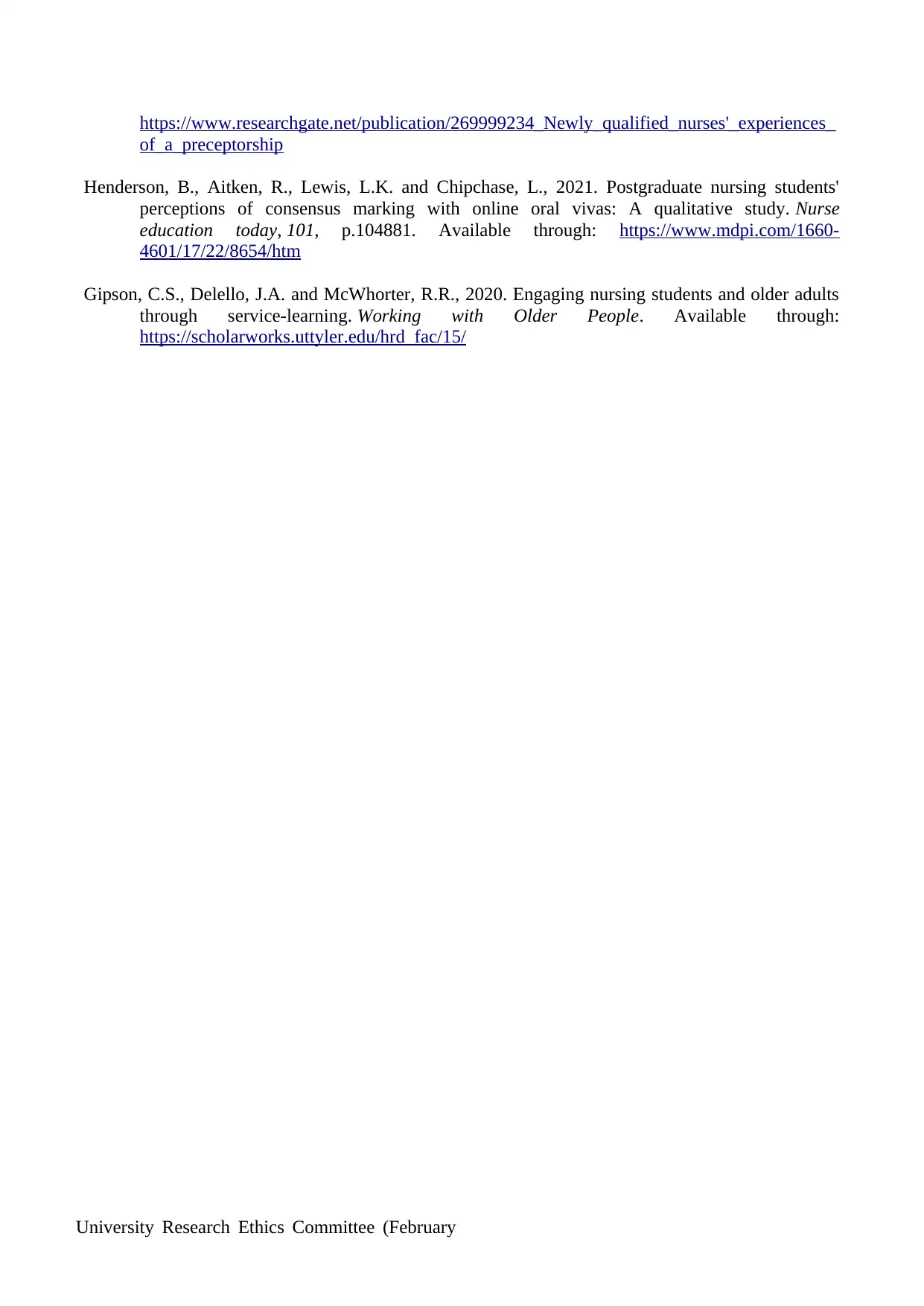
University Research Ethics Committee (February
2018)
https://www.researchgate.net/publication/269999234_Newly_qualified_nurses'_experiences_
of_a_preceptorship
Henderson, B., Aitken, R., Lewis, L.K. and Chipchase, L., 2021. Postgraduate nursing students'
perceptions of consensus marking with online oral vivas: A qualitative study. Nurse
education today, 101, p.104881. Available through: https://www.mdpi.com/1660-
4601/17/22/8654/htm
Gipson, C.S., Delello, J.A. and McWhorter, R.R., 2020. Engaging nursing students and older adults
through service-learning. Working with Older People. Available through:
https://scholarworks.uttyler.edu/hrd_fac/15/
2018)
https://www.researchgate.net/publication/269999234_Newly_qualified_nurses'_experiences_
of_a_preceptorship
Henderson, B., Aitken, R., Lewis, L.K. and Chipchase, L., 2021. Postgraduate nursing students'
perceptions of consensus marking with online oral vivas: A qualitative study. Nurse
education today, 101, p.104881. Available through: https://www.mdpi.com/1660-
4601/17/22/8654/htm
Gipson, C.S., Delello, J.A. and McWhorter, R.R., 2020. Engaging nursing students and older adults
through service-learning. Working with Older People. Available through:
https://scholarworks.uttyler.edu/hrd_fac/15/
Paraphrase This Document
Need a fresh take? Get an instant paraphrase of this document with our AI Paraphraser

University Research Ethics Committee (February
2018)
2018)
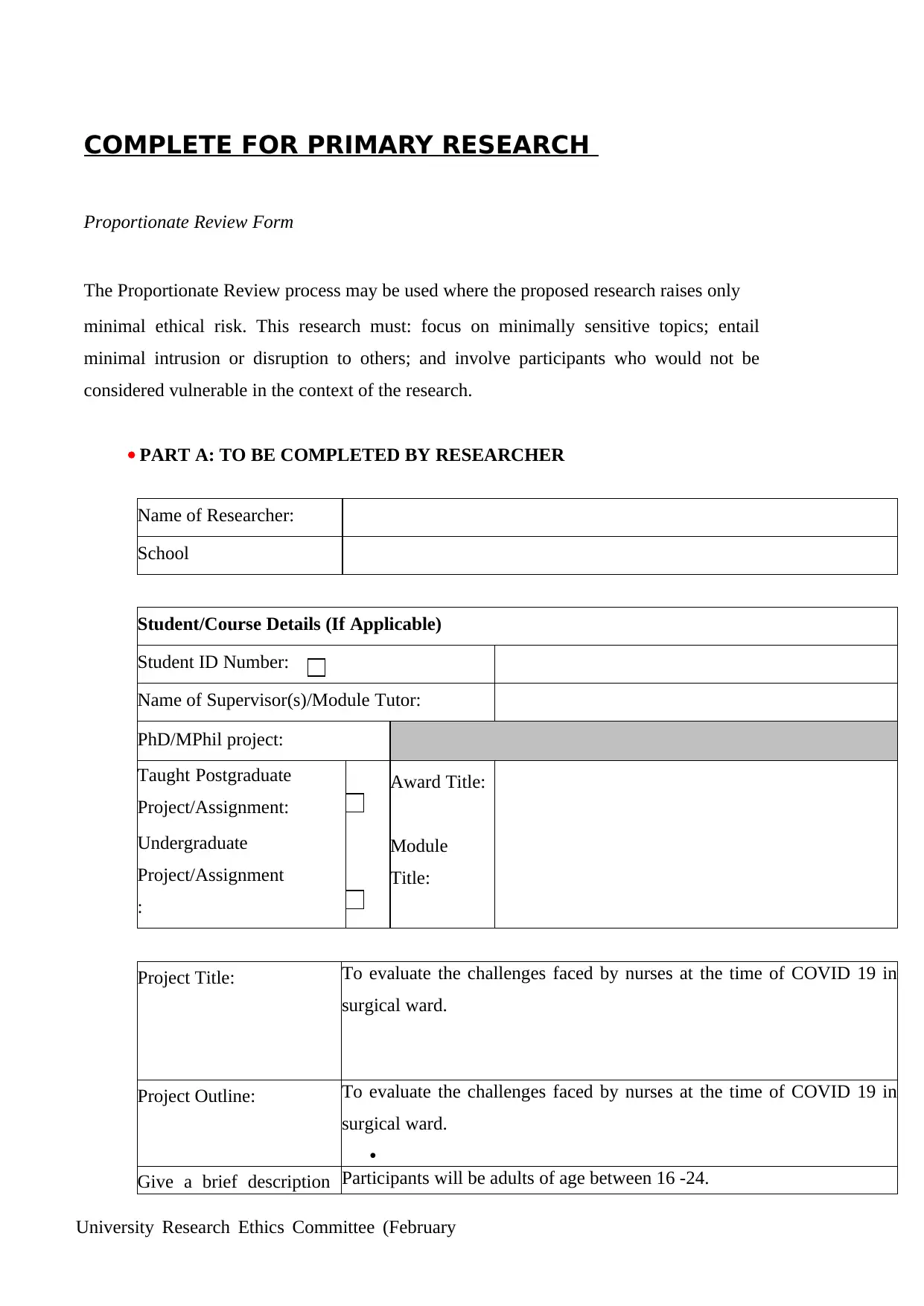
University Research Ethics Committee (February
2018)
COMPLETE FOR PRIMARY RESEARCH
Proportionate Review Form
The Proportionate Review process may be used where the proposed research raises only
minimal ethical risk. This research must: focus on minimally sensitive topics; entail
minimal intrusion or disruption to others; and involve participants who would not be
considered vulnerable in the context of the research.
PART A: TO BE COMPLETED BY RESEARCHER
Name of Researcher:
School
Student/Course Details (If Applicable)
Student ID Number:
Name of Supervisor(s)/Module Tutor:
PhD/MPhil project:
Taught Postgraduate
Project/Assignment:
Award Title:
Module
Title:
Undergraduate
Project/Assignment
:
Project Title: To evaluate the challenges faced by nurses at the time of COVID 19 in
surgical ward.
Project Outline: To evaluate the challenges faced by nurses at the time of COVID 19 in
surgical ward.
•
Give a brief description Participants will be adults of age between 16 -24.
2018)
COMPLETE FOR PRIMARY RESEARCH
Proportionate Review Form
The Proportionate Review process may be used where the proposed research raises only
minimal ethical risk. This research must: focus on minimally sensitive topics; entail
minimal intrusion or disruption to others; and involve participants who would not be
considered vulnerable in the context of the research.
PART A: TO BE COMPLETED BY RESEARCHER
Name of Researcher:
School
Student/Course Details (If Applicable)
Student ID Number:
Name of Supervisor(s)/Module Tutor:
PhD/MPhil project:
Taught Postgraduate
Project/Assignment:
Award Title:
Module
Title:
Undergraduate
Project/Assignment
:
Project Title: To evaluate the challenges faced by nurses at the time of COVID 19 in
surgical ward.
Project Outline: To evaluate the challenges faced by nurses at the time of COVID 19 in
surgical ward.
•
Give a brief description Participants will be adults of age between 16 -24.
⊘ This is a preview!⊘
Do you want full access?
Subscribe today to unlock all pages.

Trusted by 1+ million students worldwide
1 out of 26
Related Documents
Your All-in-One AI-Powered Toolkit for Academic Success.
+13062052269
info@desklib.com
Available 24*7 on WhatsApp / Email
![[object Object]](/_next/static/media/star-bottom.7253800d.svg)
Unlock your academic potential
Copyright © 2020–2025 A2Z Services. All Rights Reserved. Developed and managed by ZUCOL.





